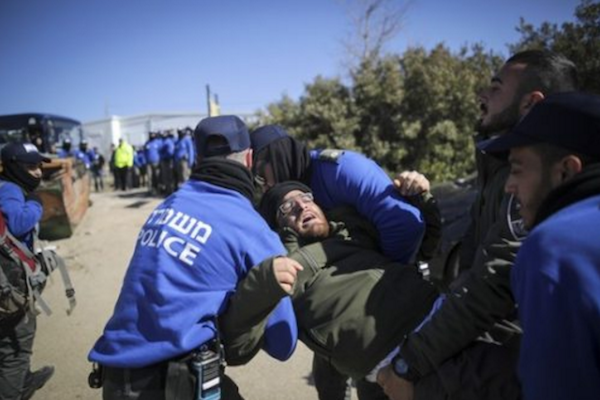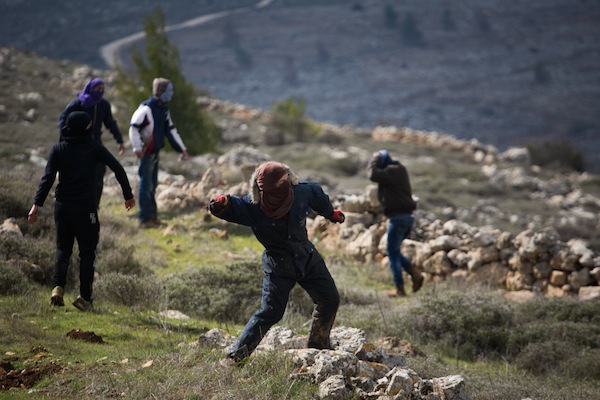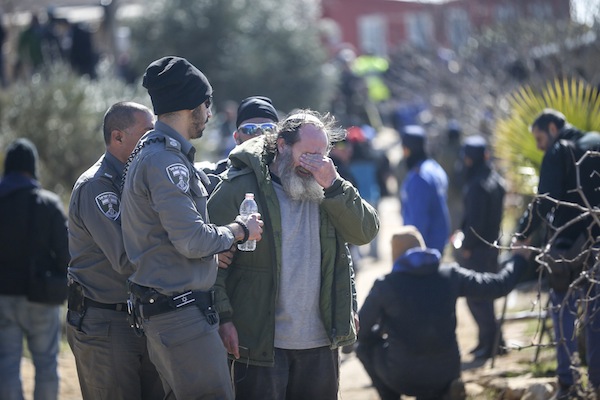After over a decade of legal battles, the state was finally forced to evacuate the illegal West Bank outpost of Amona. But that does not mean we should start celebrating any time soon.

I’ll admit it: I feel a certain sense of satisfaction watching the evacuation of Amona, the illegal West Bank outpost built on what used to be Khalt al-Sultan. The attempt to force ourselves to empathize with the evacuees who lost their homes is both morally delusional and, in a sense, manipulates our collective conscience.
The settlers of Amona did not lose their homes, rather they gave back land that legally belonged to others — the land they stole with the support of the state, which will soon compensate them with land that was stolen elsewhere. And if we do feel sorry to see the children of these families being torn from their homes, we must remember that their parents were the ones who caused the young ones to take their first steps on stolen land, forcibly turning them into accomplices to the crime.
Let us be frank: Palestinians, much like the Israeli Left — especially the radical left — have very few moments of satisfaction in their political lives. I wrote about one of these moments two weeks ago, after the High Court ordered the state to release the body of Yacoub Abu al-Qi’an, who was shot by police during the violent evacuation of Umm el-Hiran, so it could be properly buried. Despite the extremely tense hearing, we breathed a sigh of relief when the court accepted the Abu al-Qi’an family’s petition. The feeling was one of victory.
These small victories are understandable and perhaps even necessary in the long-distance runs of the consistent Israeli Left. Not only because it is always a good thing when justice — even if it is limited, partial, or lacking — is applied, but also because we need them, rationed as they are, to continue. But in order to continue effectively, we must also understand these victories in a wider context. Most of all, we must not allow them to distort our understanding of power relations.

The High Court’s decision, for instance, can be easily understood as a ruling by a neutral body that came to rule in favor of either the police or the family. Just as the photos from Amona’s evacuation could be interpreted as a situation in which the state is its authority to arbitrate between the settlers and the Palestinians in accordance with the rule of law. In both cases, those who herald the great Israeli slogan of “Jewish and democratic” were quick to praise the rule of law that, for a moment, showed its face in Amona.
Which side are we on?
This, of course, is a dangerous sleight of hand. The Israeli legal system has never been neutral in everything having to do with the settlement enterprise. It certainly does not see itself as responsible for bringing about justice vis-a-vis the settlements, and its famed judicial activism has been expressed mainly in authorizing land theft on both sides of the Green Line.

This is the same legal system that authorized the demolition of Umm el-Hiran, which took the life of Abu al-Qi’an and Israeli police officer Erez Levy. The Israeli state is not a patrolman coming to create order between the settlers and the Palestinians. Rather it is the patron saint of the former — from the regional councils in the occupied territories to the last of the hilltop youth.
We must not give up on our demand that justice — even if partial — be applied at every point in our struggle. The evacuation of Amona is a good thing, as is the fact that the High Court accepted the Abu al-Qi’an family’s petition. But an effective struggle requires a wider strategy — one which, first and foremost, requires of us to understand our reality. In this reality, the legal system, the state, the police, and the settlers are all on the same side — and it’s not our side. The imagined victories they grant us once in a while are intended to strengthen the delusion of “Jewish and democratic,” the delusion of the rule of law in a state in which the law is used to, per definition, to institutionalize theft, discrimination, and oppression. In the struggle over the future of this land, we must not forget where the real dividing line passes, and who stands on either side of it.
This article was first published in Hebrew on Local Call. Read it here.

